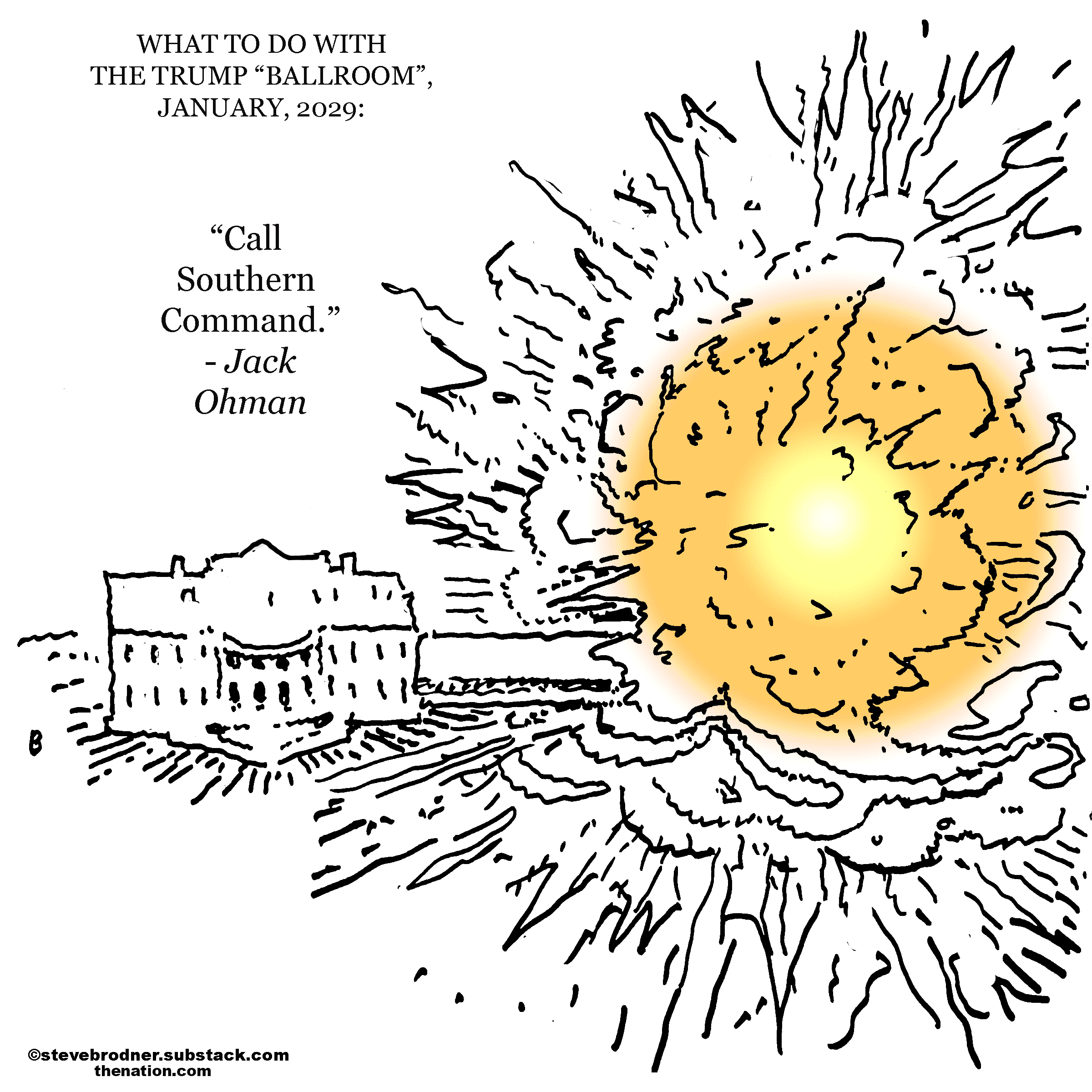Let’s Cool It With the Hot Takes
Much of the immediate commentary on the election turned out to be wrong. If we want to avoid the same outcome in the future, we’d better slow down.

First thing on that dark, dark morning after Election Day, I woke up and e-mailed my editor at The Nation to ask if I could write about why Trump had won. Obviously, it was misogyny. Then I read 547 hot takes with my breakfast coffee and wrote back. Never mind! How on earth do people write—and think—so fast? Or maybe not think, because all of the opiners miraculously found that the vote confirmed they were right all along. It was racism, it was Fox News, it was the price of eggs. It was cynicism, it was Gaza, it was transphobia. It was resentment of billionaires, it was resentment of snooty cultural elites, it was resentment of “wokeness.” It was Biden staying in the race too long; no, it was Biden leaving at all. It was Kamala’s terrible campaign; no, her campaign was fine—her loss was just part of the worldwide rejection of incumbents. Oh, and misogyny. Don’t forget misogyny.
All this insta-certainty was supposedly justified by data, long before all the votes had been counted. Trump’s victory, we were told, was a “landslide.” Actually, no: In the end, he won by about 1.5 percentage points—one of the closest races in modern times—but by the time that was clear, the perception of a thunderous victory was set in cement. So was the desertion of the Democrats by Black men, even though 77 percent of them voted for Harris (79 percent had voted for Biden), and so was the way “the economy” was declared the overriding issue. Based on what, beyond exit polls and brief media interviews with a handful of people?
Perhaps this is a hot take of my own, but I am skeptical of the all-encompassing explanatory power the media has bestowed upon “the economy.” Could it be that deeper probing would show that the price of eggs and gas is not the whole story? For some voters, their real motives may be left unspoken. Not many people in this day and age would say, “I’m not voting for a Black woman, period.” In her fascinating 2016 sociological study of white Louisianians, Strangers in Their Own Land, Arlie Russell Hochschild said her subjects rarely mentioned race and sex when they talked about feeling pushed off the ladder of upward mobility. Instead, they spoke of people unfairly “cutting ahead in line.”
When it comes to race and sex, people have learned to use vague language and alternative explanations, at least when talking to reporters and other investigators—in fact, one of Trump’s appeals is that he will allow them to be frankly racist and sexist again. While it’s true that support for the Democratic candidate decreased slightly among Black men from 2020 to 2024, if “the economy” was the sole reason, why was there no drop-off among Black women, 89 percent of whom voted for Harris, as they had done for Biden in 2020? Black women who live in the same communities and families as Black men are subject to the same economic pressures. And they are far poorer than white women, who, as in 2020, went 53 percent for Trump. So why was the grocery bill not the deciding factor for them?
Maybe “the economy” is a stand-in, or even a cover story, for other concerns. According to the polling firm YouGov, on October 27, 76.8 percent of Republicans thought the economy was getting worse. By November 18, only 45.9 percent of Republicans felt this way. Amazingly, in three weeks, the economy had gone from awful to pretty good, although nothing in the real world had changed and the hated Old Man Biden was still president.
My hottest take is that we need to cool it on the hot takes. The Internet has sped up the news cycle to the point where few people have time to just sit with reality before blathering on about it. These days, even legacy newspapers like The New York Times and The Washington Post have to rush into cyberprint or be scooped by the proliferation of Substacks, tweets, and TikToks, all clamoring for attention. And here’s the secret about hot takes: They are cheap. They don’t need research or reporting—let alone the kind of reporting that takes months or even years and a team. They don’t need fact-checking or editing or even copyediting. They are just one caffeinated person typing away as fast as possible, and if time proves him wrong, oh well! Tomorrow is another day.
Since this column is itself a bit of a hot take, I want to close with some wise words from the great Polish poet Wisława Szymborska, who won the Nobel Prize in Literature in 1996. This justly celebrated passage comes from her Nobel Lecture:
This is why I value that little phrase “I don’t know” so highly. It’s small, but it flies on mighty wings. It expands our lives to include the spaces within us as well as those outer expanses in which our tiny Earth hangs suspended. If Isaac Newton had never said to himself “I don’t know,” the apples in his little orchard might have dropped to the ground like hailstones and at best he would have stooped to pick them up and gobble them with gusto. Had my compatriot Marie Skłodowska-Curie never said to herself “I don’t know,” she probably would have wound up teaching chemistry at some private high school for young ladies from good families, and would have ended her days performing this otherwise perfectly respectable job. But she kept on saying “I don’t know,” and these words led her, not just once but twice, to Stockholm, where restless, questing spirits are occasionally rewarded with the Nobel Prize.
I doubt there will ever be a Nobel Prize in Hot Takes. Why not make “I don’t know” your motto for 2025?
Disobey authoritarians, support The Nation
Over the past year you’ve read Nation writers like Elie Mystal, Kaveh Akbar, John Nichols, Joan Walsh, Bryce Covert, Dave Zirin, Jeet Heer, Michael T. Klare, Katha Pollitt, Amy Littlefield, Gregg Gonsalves, and Sasha Abramsky take on the Trump family’s corruption, set the record straight about Robert F. Kennedy Jr.’s catastrophic Make America Healthy Again movement, survey the fallout and human cost of the DOGE wrecking ball, anticipate the Supreme Court’s dangerous antidemocratic rulings, and amplify successful tactics of resistance on the streets and in Congress.
We publish these stories because when members of our communities are being abducted, household debt is climbing, and AI data centers are causing water and electricity shortages, we have a duty as journalists to do all we can to inform the public.
In 2026, our aim is to do more than ever before—but we need your support to make that happen.
Through December 31, a generous donor will match all donations up to $75,000. That means that your contribution will be doubled, dollar for dollar. If we hit the full match, we’ll be starting 2026 with $150,000 to invest in the stories that impact real people’s lives—the kinds of stories that billionaire-owned, corporate-backed outlets aren’t covering.
With your support, our team will publish major stories that the president and his allies won’t want you to read. We’ll cover the emerging military-tech industrial complex and matters of war, peace, and surveillance, as well as the affordability crisis, hunger, housing, healthcare, the environment, attacks on reproductive rights, and much more. At the same time, we’ll imagine alternatives to Trumpian rule and uplift efforts to create a better world, here and now.
While your gift has twice the impact, I’m asking you to support The Nation with a donation today. You’ll empower the journalists, editors, and fact-checkers best equipped to hold this authoritarian administration to account.
I hope you won’t miss this moment—donate to The Nation today.
Onward,
Katrina vanden Heuvel
Editor and publisher, The Nation








